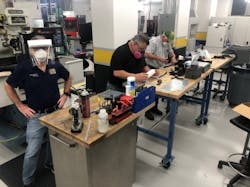DOE’s Manufacturing Traineeship Develops PPE for Medical Community
In early March, professors and students in the U.S. Department of Energy’s (DOE’s) Enhance Preparation for Intelligent Manufacturing Systems (EIPCS) traineeship at Georgia Tech set out to develop and deploy a scalable manufacturing process for face shields that are low-cost, cleanable, and quick to produce.
The team partnered with the local healthcare network to rapidly innovate and manufacture this equipment for the metro Atlanta medical community. So far, Georgia Tech has shipped more than 15,000 units to area hospitals and medical centers.
The face shields are manufactured in two parts: a reusable frame that holds the shield in place, and a film that protects the wearer’s face. The team started by using 3D printing to produce the reusable frames and then moved to waterjet cutting. To increase the rate of production, the students and faculty established designs suitable for injection molding that can produce 1,000 frames per hour. The team is also setting up high-rate die-cutting processes for the films.
EPICS students are also manufacturing entirely new equipment uniquely suited to meet healthcare challenges associated with COVID-19. For example, an EPICS student-designed and built folding intubation boxes to protect doctors during procedures that comes with a high risk of exposure to the virus. The program has already delivered 10 intubation boxes to area hospitals.
The Georgia Tech team plans to continue leveraging nimble and innovative manufacturing practices – cornerstones of the EPICS approach to training the next generation of engineers – to supply needed personal protective equipment to local healthcare providers.
The team is also open sourcing their plans on the web so that others can produce face shields through the same process. The program anticipates supplying the local medical community on the order of hundreds of thousands of units through an agreement with the Georgia Emergency Management Agency.
The EPICS traineeship focuses on preparing the next generation of engineers in emerging digital manufacturing tools such as rapid prototyping and 3D printing. Established under the workforce development portfolio of the Office of Energy Efficiency and Renewable Energy's Advanced Manufacturing Office, the program seeks engineers that are well-suited to the data-driven future of innovative manufacturing. This program is currently in its second year, with the first-year students set to graduate in May 2020.
About the Author
IW Staff
Find contact information for the IndustryWeek staff: Contact IndustryWeek
